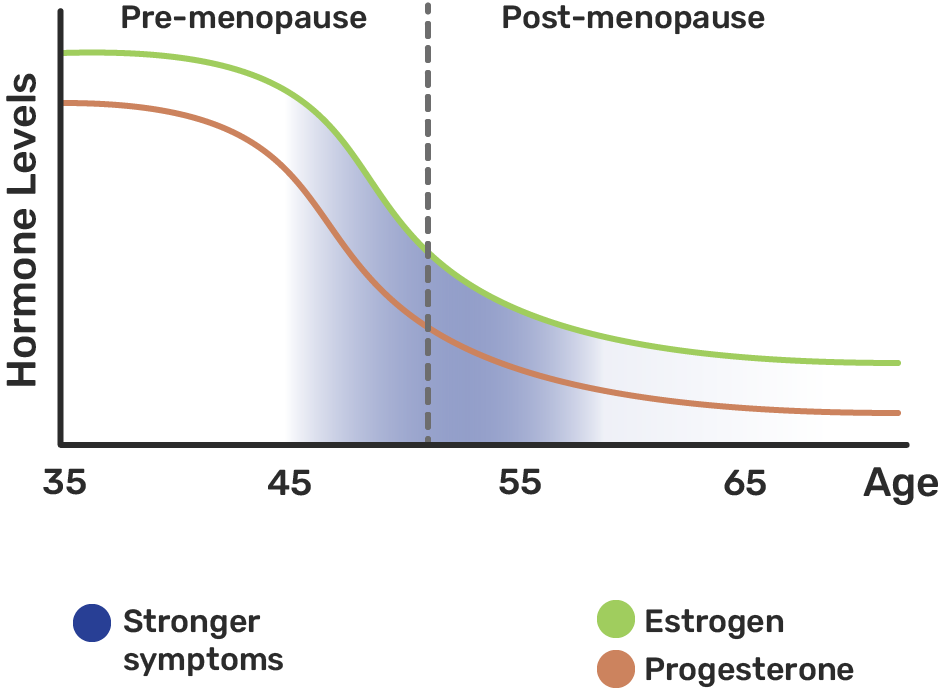
Hormones play a critical role in women’s lives. These key chemical messengers shape women’s bodies, help to organize their brains, and contribute to their instincts. So hormone levels drop and menopause starts, you may experience significant changes that impact your body and your mind.
On average, menopause begins at age 51, but the signs that menopause is approaching may begin years earlier. Though subtle at first, symptoms of hormonal change may soon affect many aspects of your life. And while every woman’s experience is unique, most women experience a variety of hormone-related symptoms for 4-8 years.
Understanding menopause and hormone replacement therapy (HRT) can be the first step toward finding relief. While it’s never too late to start HRT, there is growing evidence that the best time to initiate treatment is before the age of 60 or within 10 years of menopause. As part of a healthy lifestyle, this innovative approach can help you feel your best as you age.
Hormones work together to shape your body throughout your life, influencing everything from reproduction to emotional wellness. As you age, however, estrogen and progesterone levels naturally begin to fall and, eventually, become permanently low. While some women experience ongoing symptoms after menopause, the most uncomfortable symptoms usually occur during the period of hormonal change leading up to menopause, known as perimenopause.
These changes have a significant influence:


Estrogen is the primary sex hormone in women, produced mainly in the ovaries. It is responsible for the development and ongoing maintenance of the female reproductive system. As estrogen begins to fall during perimenopause, feedback mechanisms attempt to bring it back up. This may result in fluctuations that cause breast tenderness, bloating, and heavier periods. As estrogen continues to decline, you may experience more severe physical and emotional symptoms.
Progesterone, produced primarily in the ovaries, helps to prepare the uterus to receive a fertilized egg and supports pregnancy. As progesterone levels decrease, a range of symptoms may occur including longer and heavier periods, increasing levels of anxiety, and sleep disruptions.
Though widely regarded as a male hormone, testosterone is also produced in the ovaries. It influences a woman’s sex drive, may help to preserve bone density and muscle mass, and some of it is converted to estrogen. Though testosterone levels in women begin to decline slowly starting around age 30, some production continues in the ovaries and the adrenal glands even after menopause. The impact of decreasing testosterone levels is not well understood, but there may be an impact on libido and mood.
While falling hormone levels initiate perimenopause and, eventually, menopause, many symptoms are actually the result of hormonal fluctuation rather than a direct response to hormonal decline. This fluctuation happens because, as estrogen and progesterone levels decrease, feedback mechanisms prompt your body to try to make more in an attempt to re-establish equilibrium. The resulting ups and downs help to explain why symptoms can vary from person to person and change so drastically throughout the years.
The most common signs and symptoms of perimenopause and menopause include:


This list is by no means exhaustive, and you may experience different symptoms at different times. But there is no reason to suffer in silence.
Menopause and hormone replacement therapy have become specialized fields of medicine, opening up new opportunities to find relief from symptoms. A hormone specialist will have a deep understanding of the physiological processes you are experiencing the profound impact they can have on your life. They will also have the expertise necessary to help you find relief.
The unpredictable nature of menopause means that there is no standard treatment protocol. Your hormone levels, genetics, general health, and lifestyle all affect the way that you experience this milestone. As such, it’s critical that your doctor performs thorough hormone testing in addition to taking an in-depth look at your medical history and current symptoms.
HRT is widely regarded as the most effective treatment for menopause symptoms because it directly compensates for hormonal decline. Typically, this involves using a combination of estrogen and progesterone to restore healthy hormone levels, although women who have undergone a hysterectomy may use estrogen alone. In some cases, testosterone may also be beneficial.
Today, a variety of administration methods are available to meet women’s diverse needs and treatment goals during perimenopause and menopause. If you and your doctor decide HRT is a good option, you may be able to choose from the following:
Method |
Administered via |
Pros |
Cons |
Transdermal Patches |
Adhered to the skin of the lower abdomen or upper buttock at regular intervals | Ease of application Delivers a premeasured dose May have less danger of blood clots than oral form Bypasses the digestive system | Adhesive may loosen and peel off before dose has been dispensed May cause skin irritation May be visible |
Topical Gels, Creams & Sprays |
Applied to the skin of the arm or leg | Ease of application May have less danger of blood clots than oral form Bypasses the digestive system and liver | Must be applied daily Dose is not premeasured May rub or wash off Must dispense the correct amount May transfer to others May cause skin irritation |
Vaginal Creams, Rings & Suppositories |
Applied in or around the vagina | Especially effective for vaginal symptoms Ring is effective for 3 months Action is local (less systemic absorption) May have less danger of blood clots than oral form | Some require daily application Low doses may not address hot flashes and other symptoms Higher doses may present same blood clotting risk as oral form Long-term use may increase risk of endometrial cancer |
Pills |
Swallowed daily | Familiar format Easy to take | Must be taken daily Absorption may be altered with GI or liver disease Increases the risk of blood clots |
Pellets |
Implanted below the skin on the hip or another fatty area through a small incision under local anesthesia | Steady dosing without fluctuations Lasts 3-6 months Does not require daily compliance | Requires minor outpatient procedure 2-4 times per year Small risk of infection, scarring, or extrusion Pellets may be added, but they cannot be removed |
While standardized hormone replacement therapy preparations are often available in only one form, custom-compounded HRT allows you to choose an administration method that works for you. Custom HRT also allows your treatment to be formulated to your body’s specific hormonal needs based on lab testing and refined according to your changing needs.
In addition to hormone replacement therapy, your doctor can make diet and exercise recommendations to support your overall health through menopause. Additional complementary interventions may include supplements, relaxation, meditation, biofeedback, and acupuncture.
The onset of menopause coincides with the age range at which some serious chronic health conditions become common. The incidence of breast cancer, heart disease, stroke, type 2 diabetes, osteoporosis, and dementia all rise during this stage of life.
Hormone replacement therapy for menopause may provide a protective effect as women enter this important transition. As researchers continue to explore the connection between hormones and the chronic health conditions associated with aging, women must be proactive to minimize risk factors and maximize quality of life.
FIND A PROVIDERThe symptoms of menopause are a call to action: to preserve your quality of life, restore comfort and peace of mind, maintain your productivity, and, ultimately, to ensure continuing good health. Having access to effective treatments that include hormone replacement therapy is invaluable to helping you more comfortably weather the menopause transition. By seeking out state-of-the-art care from a knowledgeable and compassionate hormone specialist, you can optimize the benefits, minimize the risks, and continue to live your best life after menopause.
FIND A PROVIDER
Find out more about the EvexiPEL® Method and see if you qualify to join the Certified EvexiPEL® Medical Provider Network.


Is your medical provider in our network? Let us know and we’ll reach out to them about becoming a Certified EvexiPEL® Provider, bringing you one step closer to receiving your hormone replacement therapy.
© 2023 EVEXIAS Health Solutions – All Rights Reserved – Privacy Policy
This website is for educational purposes only. It is not intended as a substitute for the diagnosis, treatment, and advice of a qualified licensed professional. This site offers people medical information and tells them their alternative medical options, but in no way should anyone consider that this site represents the practice of medicine. This site assumes no responsibility for how this material is used. Also note that this website frequently updates its contents, due to a variety of reasons, therefore, some information may be out of date. The statements regarding alternative treatments for cancer have not been evaluated by the Food and Drug Administration.